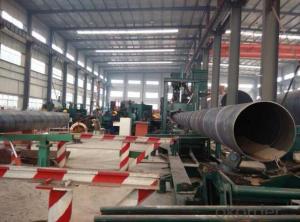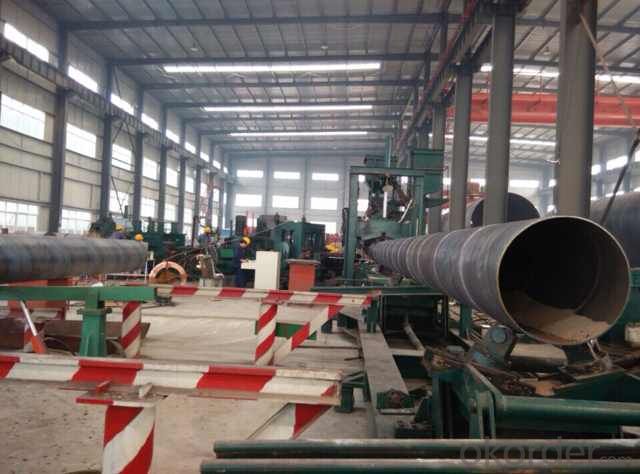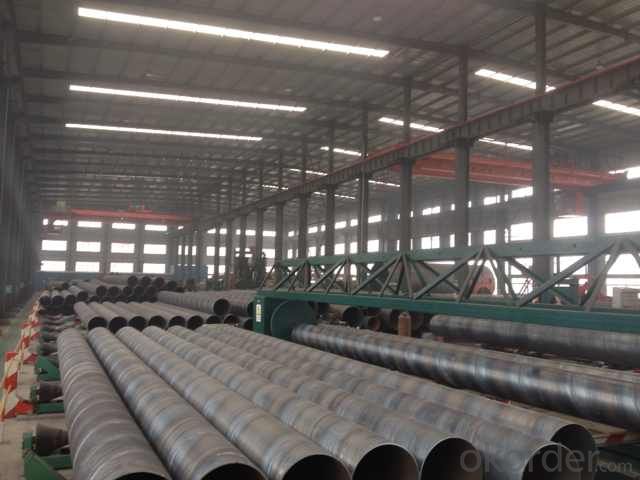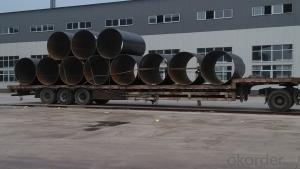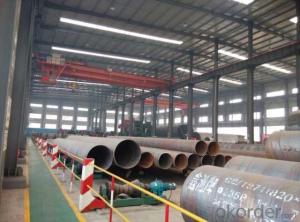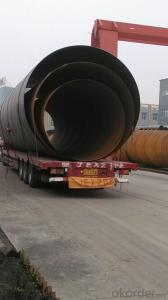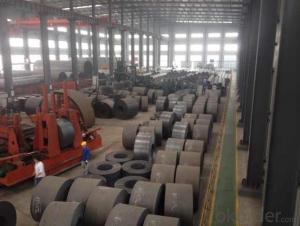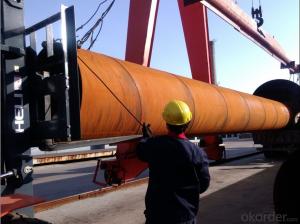SSAW CARBON STEEL PIPE 219-3920MM API ASTM
- Loading Port:
- China Main Port
- Payment Terms:
- TT OR LC
- Min Order Qty:
- -
- Supply Capability:
- -
OKorder Service Pledge
OKorder Financial Service
You Might Also Like
Packaging & Delivery
Packaging Detail: | standard export packing or as customer's requirement |
Delivery Detail: | within 10 - 30 days |
Specifications
Spiral Welded Steel Pipes and Tubes
1.Material:Q195-Q235
2.Length:1-12m
3.WT:1.0-14mm
4.O.D.:219-3920mm
Product Description:
1.Material : Q235,Q345,L245,L290,L360,L415,L450,L485,GrB,X42,46,X52,X56,X60,X65,X70,X80,X100
2,Standard: SY/T5037-2000,GB/T9711-2011,API Spec 5L PSL1/PSL2,ASTM A252\A53,ISO3183,DIN17172,EN10217,JIS G3457,AWWA C200,ASTM A139,ASTM A671,ASTM A672
3.Wall thickness: 3.0mm-30mm
4.Outer diameter: φ219mm-3920mm
5,Length: 5m-12m or as customer requirement
6,Corrosion protection standard: DIN30670,DIN30671, AWWAC210, AWWA C203, SY/T0413-2002,SY/T0414-2002
7,Application: Oil, gas, natural gas, water pipe, thermal electricity pipe, steel structure engineering, etc
Q195-Q345 Material Steel Pipe's Materials
Elements | Chemical Compsition% | Mechanical Property | ||||||
| C% | Mn% | S% | P% | Si% | Yield Point (Mpa) | Tensile Strength(Mpa) | Elongation |
Q195 | 0.06-0.12 | 0.25-0.50 | <0.050 | <0.045 | <0.030 | >195 | 315-430 | 32-33 |
Q215 | 0.09-0.15 | 0.25-0.55 | <0.05 | <0.045 | <0.030 | >215 | 335-450 | 26-31 |
Q235 | 0.12-0.20 | 0.30-0.70 | <0.045 | <0.045 | <0.030 | >235 | 375-500 | 24-26 |
Q345 | <0.20 | 1.0-1.6 | <0.040 | <0.040 | <0.55 | >345 | 470-630 | 21-22 |
- Q: What is the typical length of a steel pipe?
- The typical length of a steel pipe can vary depending on its purpose and application. However, standard lengths for steel pipes commonly range from 18 feet to 40 feet.
- Q: What are the factors that affect the pressure rating of steel pipes?
- There are several factors that can affect the pressure rating of steel pipes. These include the material and grade of the steel used, the wall thickness of the pipe, the diameter of the pipe, the temperature at which the pipe will be operating, and the type of fluid or gas being transported through the pipe. Additionally, factors such as corrosion, external loads, and installation methods can also impact the pressure rating of steel pipes.
- Q: Can steel pipes be used for conveying compressed air?
- Yes, steel pipes can be used for conveying compressed air. Steel pipes are known for their high strength and durability, making them suitable for handling high-pressure applications such as compressed air systems. Additionally, steel pipes are resistant to corrosion and can withstand extreme temperatures, making them a reliable choice for conveying compressed air.
- Q: How to perform nondestructive inspection of steel tubes
- Radiographic inspection (RT)One of the earliest nondestructive testing methods is widely used in the inspection of internal defects of metals and non-metallic materials and products, with a history of at least 50 years. It has incomparable unique advantages, that is to test the correctness, reliability and intuition of the defects, and the ray film can be used for the analysis of defects and as a quality certificate archive. But this method also has the disadvantages of more complicated equipment and higher cost, and should pay attention to the protection of radiation.
- Q: Can steel pipes be used for oil refinery applications?
- Yes, steel pipes can be used for oil refinery applications. Steel pipes offer many advantages for oil refinery applications including high strength, durability, and resistance to corrosion. They are able to withstand high pressure and temperature conditions that are common in oil refinery operations. Steel pipes are also easy to transport and install, making them a popular choice for oil refinery projects. Additionally, steel pipes can be customized to meet specific requirements such as size, thickness, and coating, making them suitable for a wide range of oil refinery applications.
- Q: Can steel pipes be used for food processing facilities?
- Steel pipes are indeed applicable for food processing facilities. These pipes are frequently utilized in such facilities because of their impressive robustness, strength, and ability to resist corrosion. Moreover, they can be easily cleaned, a crucial factor in maintaining the required hygiene standards in food processing environments. Furthermore, steel pipes are capable of withstanding high temperatures and pressure, rendering them suitable for a wide range of food processing applications, including the transportation of liquids, gases, and solids. Nevertheless, it is imperative to guarantee that the steel pipes employed in food processing facilities are constructed from materials that have received approval for food contact. Additionally, regular inspections and maintenance must be carried out to prevent any potential risks of contamination.
- Q: What are the uses of seamless steel tubes?
- A large number of pipes used for conveying fluids, such as pipelines for transporting petroleum, natural gas, gas, water, and certain solid materials.
- Q: What's the difference between hot dip galvanizing and cold galvanizing? Which kind of galvanizing method is good?
- There are two kinds of hot dip galvanizing, zinc plated and non galvanized. The flowers must be hot-dip galvanized, without flowers, similar to galvanized.
- Q: How are steel pipes used in agriculture?
- Steel pipes are widely used in agriculture for various purposes. One common application is irrigation systems. Steel pipes can be used to transport water from a water source, such as a well or a reservoir, to different areas of a farm. These pipes are durable and can withstand the pressure of water, making them ideal for long-distance water transportation. Additionally, steel pipes are also used for drainage systems in agriculture. They can be used to remove excess water from fields, preventing waterlogging and ensuring proper drainage. Steel pipes are resistant to corrosion, which is important in agricultural settings where they may be exposed to moisture and various chemicals. Moreover, steel pipes are used in the construction of greenhouse structures. They provide structural support for the greenhouse framework and allow for the installation of irrigation systems and other equipment. Steel pipes are strong, sturdy, and can withstand harsh weather conditions, making them suitable for greenhouse construction. Furthermore, steel pipes are utilized in livestock farming. They are commonly used to create fences and enclosures for animals, providing a secure and durable barrier. Steel pipes are also used in the construction of animal shelters and barns. In summary, steel pipes play a crucial role in agriculture. They are used for irrigation systems, drainage systems, greenhouse construction, and livestock farming. Their durability, strength, and resistance to corrosion make them an excellent choice for various agricultural applications.
- Q: Can steel pipes be used for offshore oil and gas platforms?
- Offshore oil and gas platforms can utilize steel pipes, as they are known for their durability, strength, and ability to withstand harsh marine conditions. These pipes are typically constructed from high-quality steel alloys, capable of enduring the immense pressures and temperatures of offshore drilling and production activities. Moreover, steel pipes offer versatility and easy welding, facilitating the creation of intricate pipeline networks on offshore platforms. Furthermore, protective coatings like epoxy or anti-corrosion coatings can be applied to steel pipes, bolstering their resistance to corrosion and extending their lifespan in the offshore environment. In summary, steel pipes are a reliable and extensively employed option for transporting oil and gas on offshore platforms.
Send your message to us
SSAW CARBON STEEL PIPE 219-3920MM API ASTM
- Loading Port:
- China Main Port
- Payment Terms:
- TT OR LC
- Min Order Qty:
- -
- Supply Capability:
- -
OKorder Service Pledge
OKorder Financial Service
Similar products
Hot products
Hot Searches
Related keywords
